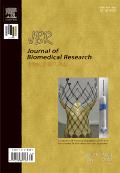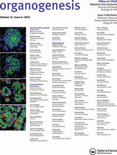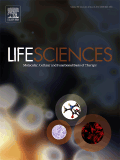
BIOMEDICAL RESEARCH-TOKYO
Scope & Guideline
Unveiling Breakthroughs in Biochemistry and Medicine
Introduction
Aims and Scopes
- Molecular Mechanisms of Disease:
Research exploring the molecular and cellular mechanisms underlying various diseases, including cancer, metabolic disorders, and neurodegenerative diseases. - Regenerative Medicine and Tissue Engineering:
Studies focusing on the development of therapeutic strategies for tissue repair and regeneration, utilizing stem cells and innovative biomaterials. - Pharmacology and Therapeutics:
Investigations into the pharmacological effects of various compounds, including natural products, on disease models and clinical applications. - Neuroscience and Behavioral Research:
Research examining the neurological basis of behavior and the effects of pharmacological agents on neural activity and cognitive functions. - Immunology and Inflammation:
Studies addressing the role of the immune system in disease processes, including inflammation and autoimmune disorders. - Genetics and Epigenetics:
Research focusing on genetic and epigenetic factors influencing health, disease progression, and therapeutic responses.
Trending and Emerging
- Targeted Therapies and Precision Medicine:
An increasing number of studies focus on targeted therapies tailored to individual genetic profiles, emphasizing the importance of personalized medicine in treating diseases. - Neuroinflammation and Pain Management:
There is a growing interest in understanding the role of neuroinflammation in chronic pain conditions, with research exploring novel analgesic compounds and their mechanisms of action. - Microbiome Research:
Emerging studies investigate the relationship between the microbiome and various health conditions, reflecting a trend toward understanding the complex interactions between gut health and systemic diseases. - Epigenetics in Disease:
Research on epigenetic modifications and their implications in disease mechanisms is gaining traction, especially concerning cancer and metabolic disorders. - Innovations in Regenerative Medicine:
Recent works emphasize advancements in regenerative medicine techniques, such as the use of stem cells and biomaterials for tissue engineering, indicating a shift towards practical applications in clinical settings.
Declining or Waning
- Traditional Pharmacology:
Research focusing on traditional pharmacological approaches and drug development appears to be declining, with more emphasis on novel therapeutic strategies and personalized medicine. - Animal Models in Drug Testing:
There is a noticeable decrease in studies solely focused on animal models for drug testing, as researchers increasingly seek alternative methods or in vitro models that might offer more ethical and applicable insights. - Basic Histology and Anatomy Studies:
Papers concentrating exclusively on histological and anatomical descriptions without a clear link to functional implications or disease relevance are becoming less common, indicating a move towards more applied research.
Similar Journals

Biomedical Research and Therapy
Exploring the forefront of biomedical science and therapy.Biomedical Research and Therapy is a pioneering journal published by BIOMEDPRESS, dedicated to the field of biomedical sciences. With its ISSN 2198-4093, this journal aims to disseminate high-quality research and innovative therapies that advance knowledge in biomedical research. Although it operates on a non-open access model, it provides crucial insights into various topics such as drug discovery, disease mechanisms, regenerative medicine, and clinical applications. The journal's rigorous peer-review process ensures the publication of critical findings and methodologies, making it a vital resource for researchers, practitioners, and students interested in the constantly evolving landscape of biomedical research. With converged years from 2020 to 2024 and an emerging reputation in its field, Biomedical Research and Therapy is positioned to contribute significantly to the global scientific community, enriching the discourse around therapeutic advancements and biomedical innovations.

BRAZILIAN JOURNAL OF MEDICAL AND BIOLOGICAL RESEARCH
Transforming Ideas into Scientific BreakthroughsThe BRAZILIAN JOURNAL OF MEDICAL AND BIOLOGICAL RESEARCH, published by the ASSOC BRAS DIVULG CIENTIFICA, serves as a vital platform for the dissemination of cutting-edge research in the fields of medicine and biological sciences. With an ISSN of 0100-879X and E-ISSN 1414-431X, this Open Access journal has been championing free access to vital scientific knowledge since 1997. It is indexed in Scopus with notable rankings across various disciplines, including a rank of #131 in General Medicine (79th percentile) and #20 in Pharmacology, Toxicology, and Pharmaceutics (75th percentile). Covering a broad scope of topics, the journal primarily focuses on areas such as biochemistry, biophysics, immunology, neuroscience, and physiology, with a commendable categorization of Q2 and Q3 quartiles for several relevant fields in 2023. Through its commitment to high-quality research and robust peer review processes, the journal not only consolidates its reputation within the academic community but also significantly contributes to the enhancement of scientific knowledge and innovation in Brazil and beyond. Researchers, professionals, and students will find an invaluable resource in this journal, which is pivotal for those looking to stay abreast of the latest developments in medical and biological research.

Biomedicines
Shaping the future of medicine through high-quality research.Biomedicines, published by MDPI, is a prestigious open-access journal dedicated to the rapidly evolving fields of biochemistry, genetics, and molecular biology, as well as broader aspects of medicine. Since its inception in 2013, Biomedicines has established itself as a leading platform for researchers, practitioners, and students to disseminate high-quality research and innovative findings, reflected in its impressive Q1 ranking in both the Biochemistry, Genetics and Molecular Biology and Medicine categories. With its commitment to accessibility and impactful scholarship, the journal has quickly garnered an international readership, positioning itself as a vital resource in advancing scientific knowledge and fostering collaboration in the biomedical community. Operating from its headquarters in Basel, Switzerland, Biomedicines continues to thrive with features such as rigorous peer review and a fast publication process, making it an essential journal for those looking to contribute to and stay updated in their respective fields.

EXPERIMENTAL AND MOLECULAR MEDICINE
Empowering researchers with open access to cutting-edge findings.EXPERIMENTAL AND MOLECULAR MEDICINE, published by SpringerNature, is a premier open-access journal that has been at the forefront of biomedical research since its establishment in 1996. With a focus on innovative studies in biochemistry, molecular biology, and clinical biochemistry, the journal has consistently maintained a distinguished position within the top quartile (Q1) across multiple categories, underscoring its significant impact in these fields. The journal offers researchers and practitioners a platform for high-quality, peer-reviewed articles that advance our understanding of molecular mechanisms underlying health and disease. As a crucial resource for scholars seeking to explore cutting-edge research and practical advancements, its inclusion in relevant databases such as Scopus reflects an exceptional ranking with notable percentiles—placing it among the best in biomedical sciences. With a commitment to open access, EXPERIMENTAL AND MOLECULAR MEDICINE ensures that findings are readily available to the global academic community, facilitating collaboration and innovation in molecular medicine.

Journal of Biomedical Research
Uncovering Breakthroughs in Health and DiseaseJournal of Biomedical Research, published by Nanjing Medical University in China, is a prominent platform for groundbreaking discoveries in the fields of Biochemistry, Genetics, and Molecular Biology, as well as Medicine. With an ISSN of 1674-8301 and an E-ISSN of 1876-4819, the journal offers a vital opportunity for researchers, professionals, and students to disseminate insightful research findings. Although not currently available as an open access journal, its inclusion in the second quartile of both Biochemistry and Medicine categories underscores its growing influence and commitment to high-quality scholarship, as evidenced by its historical compliance with Scopus rankings prior to 2009. By fostering an interdisciplinary approach, the Journal of Biomedical Research aims to bridge gaps in current biomedical understanding and encourages innovative research that can lead to significant contributions in improving health outcomes. Its editorial policies guarantee rigorous peer review, making it a trusted source of knowledge in the biomedical community.

Cell Reports Medicine
Transforming discoveries into medical advancements for all.Cell Reports Medicine, published by Cell Press, represents a pivotal advancement in the open access landscape of biomedical research since its inception in 2020. With a dedicated focus on the intersection of medicine, biochemistry, genetics, and molecular biology, this journal has quickly established itself as a key resource, earning a remarkable Q1 ranking in these fields. Based in the United States, Cell Reports Medicine boasts impressive metrics, ranking #25 out of 636 in General Medicine and #18 out of 221 in Biochemistry, underscoring its influence and reach within the scientific community, with a notable 96th and 92nd percentile respectively. As a fully open access journal, it fosters global dissemination of knowledge, ensuring that groundbreaking research is readily available to researchers, professionals, and students alike. The journal not only promotes high-quality research but also aims to bridge the gap between molecular discoveries and clinical applications, making it an essential addition to any academic library or researcher's toolkit.

Organogenesis
Advancing the Frontiers of Developmental Biology.Organogenesis is a leading journal published by Taylor & Francis Inc, dedicated to advancing the field of developmental biology and regenerative medicine. With an ISSN of 1547-6278 and E-ISSN 1555-8592, this journal spans an extensive research scope that includes embryology, transplantation, and biomedical engineering, distinguishing itself as a crucial platform for researchers and practitioners alike. Its impact is reflected in its performance across various categories in 2023, earning Q3 rankings in Biomedical Engineering and Embryology, Q4 in Developmental Biology, and Q2 in Transplantation, showcasing its reputable standing among peer journals. Moreover, with Scopus rankings indicating strong positioning in the fields of medicine and biochemistry, Organogenesis is essential for those looking to publish or stay updated on pioneering research. The journal facilitates rigorous peer-review and offers a forum for disseminating innovative findings, making it an invaluable resource for academics, professionals, and students committed to understanding the complexities of organism development.

Advanced Biology
Empowering Science Through Rigorous Peer ReviewAdvanced Biology, published by WILEY-V C H VERLAG GMBH, serves as a premier platform where innovative research and scientific breakthroughs in the fields of biochemistry, genetics, and molecular biology converge. Established in 2021, this journal has rapidly ascended to prominence, securing Q1 rankings in its primary categories, including general biochemistry and biomedical engineering, and a solid Q2 ranking in biomaterials. With an ISSN of 2701-0198 and an emphasis on open access, Advanced Biology ensures that rigorous peer-reviewed research is accessible to a global audience, enhancing visibility and fostering collaboration among researchers, professionals, and students alike. By 2024, it aims to continually elevate scientific understanding and innovation, catering to the growing interdisciplinary nature of these critical fields. With Scopus rankings placing it amongst the top quartiles in its disciplines, Advanced Biology is poised to make significant contributions to the future of life sciences.

Biomed Research International
Advancing biomedical knowledge, one discovery at a time.Biomed Research International is a prominent open access journal published by HINDAWI LTD, dedicated to advancing the field of biomedical research. With its ISSN 2314-6133 and E-ISSN 2314-6141, this journal has been a significant contributor to the scientific community since its inception in 2013, making scholarly work accessible to a global audience. The journal's scope encompasses a range of disciplines, including biochemistry, genetics, molecular biology, immunology, microbiology, and medicine, reflecting its commitment to interdisciplinary research. Ranked in the Q2 quartile as of 2023 across several relevant categories, Biomed Research International is recognized for its high-quality publications that foster innovation and collaboration in biomedical studies. Researchers, professionals, and students looking to share and gain insights into cutting-edge biomedical discoveries will find this journal an essential resource. With a focus on rapid dissemination of research findings, the journal serves as a vital platform for academics to engage with contemporary issues in health and disease, ultimately contributing to the advancement of medical science.

LIFE SCIENCES
Championing high-quality research for a healthier future.LIFE SCIENCES, published by PERGAMON-ELSEVIER SCIENCE LTD, is an esteemed international journal that has been advancing the field since its inception in 1962. With an ISSN of 0024-3205 and an E-ISSN of 1879-0631, it serves as a critical forum for researchers, professionals, and students within the realms of biochemistry, genetics, molecular biology, medicine, and pharmacology. Currently ranked in the Q1 category across multiple disciplines, including a remarkable 2nd rank in General Pharmacology, Toxicology, and Pharmaceutics, the journal maintains a prestigious position in academic circles, evidenced by its high impact factor and significant percentile ranks. While LIFE SCIENCES is not an open-access journal, it remains dedicated to publishing high-quality, peer-reviewed research that pushes the boundaries of knowledge and fosters innovation. With converged research interests leading into 2024, LIFE SCIENCES continues to be a pivotal resource for the dissemination of influential findings, making it an indispensable tool for those engaged in the life sciences.